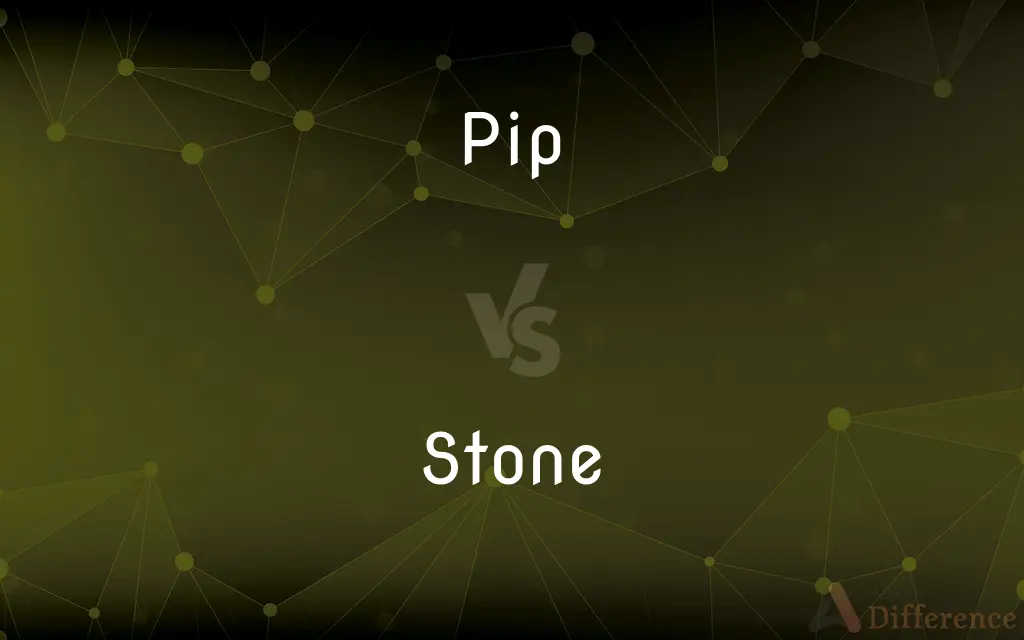Pip vs. Stone — What's the Difference?
By Fiza Rafique & Urooj Arif — Updated on April 14, 2024
Pip refers to a small seed in a fruit like an apple, focusing on seed-bearing fruits; stone pertains to a large, hard seed in fruits like peaches, emphasizing stone fruits.

Difference Between Pip and Stone
Table of Contents
ADVERTISEMENT
Key Differences
A pip is the small seed found inside fruits such as apples, oranges, and lemons. It is generally small and can be numerous within a single fruit. On the other hand, a stone, also known as a pit, is the large hard seed found in fruits like peaches, plums, and cherries.
Pips are often numerous within their fruit enclosures and are surrounded by a soft fruit flesh that is typically consumed. Whereas stones are usually solitary within their fruits and are surrounded by a juicy, fleshy part that is edible.
The structure of a pip is generally softer and can be chewed if desired, although they are often discarded. In contrast, stones are hard and inedible, posing a risk to teeth if bitten unintentionally.
In terms of fruit classification, fruits containing pips are categorized as pome fruits or citrus fruits, depending on their botanical characteristics. Meanwhile, fruits with stones are categorized as stone fruits or drupes, which have a unique botanical makeup.
Pips can be used in various culinary and traditional medicinal practices, often grounded or used whole in recipes. Stones, due to their hard nature, are typically not used in cooking but may be used decoratively or collected as curios.
ADVERTISEMENT
Comparison Chart
Size
Small
Large
Number per fruit
Often multiple
Usually one
Edibility
Non-toxic, but rarely eaten
Inedible, hard
Found in
Pome and citrus fruits
Stone fruits (drupes)
Usage in cooking
Sometimes used in recipes
Not used in cooking
Compare with Definitions
Pip
Sometimes used metaphorically to describe something small and insignificant.
Compared to last year's profits, this year's are just a pip.
Stone
In culinary contexts, recipes often warn about the presence of stones.
The recipe cautioned to remove all stones from the apricots before baking.
Pip
A small seed of certain fruits, notably apples and citrus.
She carefully removed every pip from the orange before juicing it.
Stone
Stones are not consumable and must be discarded.
She collected the stones from the cherries to dispose of them.
Pip
Used to refer to the seeds of small fruits.
The pips were scattered across the table after the kids finished eating.
Stone
The hard, inner seed of certain fruits like peaches and cherries.
He cracked the stone of the peach to extract the seed inside.
Pip
In gardening, pips are often planted to grow new fruit trees.
He saved the pips from the lemon to try planting them in his garden.
Stone
Decoratively used in crafts or as a natural ornament.
The washed and polished cherry stones were used in a rustic table centerpiece.
Pip
Pips can be annoying to eaters who prefer a seedless experience.
She disliked the pips in grapes, preferring seedless varieties.
Stone
Generally found singly in stone fruits.
The plum had a large stone in the center, making it difficult to slice neatly.
Pip
The small seed of a fruit, as that of an apple or orange.
Stone
Hard solid non-metallic mineral matter of which rock is made, especially as a building material
The houses are built of stone
High stone walls
Pip
A dot indicating a unit of numerical value on dice or dominoes.
Stone
A piece of stone shaped for a purpose, especially one of commemoration, ceremony, or demarcation
A memorial stone
Boundary stones
Pip
A mark indicating the suit or numerical value of a playing card.
Stone
A hard seed in a cherry, plum, peach, and some other fruits.
Pip
A spot or speck.
Stone
A unit of weight equal to 14 lb (6.35 kg)
I weighed 10 stone
Pip
A rootstock of certain flowering plants, especially the lily of the valley.
Stone
A natural shade of whitish or brownish-grey
Stone stretch trousers
Pip
Any of the small segments that make up the surface of a pineapple.
Stone
Throw stones at
Two people were stoned to death
Policemen were stoned by the crowd
Pip
(Informal) A shoulder insignia indicating the rank of certain officers, as in the British Army.
Stone
Remove the stone from (a fruit).
Pip
See blip.
Stone
Build, face, or pave with stone
The honey-stoned, eighteenth-century city
Pip
A short, high-pitched radio signal.
Stone
Concreted earthy or mineral matter; rock.
Pip
A disease of birds, characterized by a thick mucous discharge that forms a crust in the mouth and throat.
Stone
Such concreted matter of a particular type. Often used in combination
Sandstone.
Soapstone.
Pip
(Slang) A minor unspecified human ailment.
Stone
A small piece of rock.
Pip
To wound or kill with a bullet.
Stone
A piece of rock that is used in construction
A coping stone.
A paving stone.
Pip
To defeat.
Stone
A gravestone or tombstone.
Pip
To blackball.
Stone
A grindstone, millstone, or whetstone.
Pip
To break through (the shell) in hatching. Used chiefly of birds.
Stone
A milestone or boundary.
Pip
To peep or chirp.
Stone
A gem or precious stone.
Pip
Any of various respiratory diseases in birds, especially infectious coryza.
Stone
Something, such as a hailstone, resembling a stone in shape or hardness.
Pip
Of humans, a disease, malaise or depression.
Stone
(Botany) The hard covering enclosing the seed in certain fruits, such as the cherry, plum, or peach.
Pip
(obsolete) A pippin, seed of any kind.
Stone
(Medicine) A mineral concretion in an organ, such as the kidney or gallbladder, or other body part; a calculus.
Pip
(UK) A seed inside certain fleshy fruits (compare stone/pit), such as a peach, orange, or apple.
Apple pips are edible, but don't have a pleasant taste.
Stone
Pl. stone Abbr. st. A unit of weight in Great Britain, 14 pounds (6.4 kilograms).
Pip
Something or someone excellent, of high quality.
Stone
(Printing) A table with a smooth surface on which page forms are composed.
Pip
P in RAF phonetic alphabet.
Stone
Relating to or made of stone
A stone wall.
Pip
One of the spots or symbols on a playing card, domino, die, etc.
Stone
Made of stoneware or earthenware.
Pip
One of the stylised version of the Bath star worn on the shoulder of a uniform to denote rank, e.g. of a soldier or a fireman.
Stone
Complete; utter. Often used in combination
A stone liar.
Stone-deaf.
Pip
A spot; a speck.
Stone
Completely; utterly
Stone cold.
Standing stone still.
Pip
A spot of light or an inverted V indicative of a return of radar waves reflected from an object; a blip.
Stone
To hurl or throw stones at, especially to kill with stones.
Pip
A piece of rhizome with a dormant shoot of the lily of the valley plant, used for propagation
Stone
To remove the stones or pits from.
Pip
One of a series of very short, electronically produced tones, used, for example, to count down the final few seconds before a given time or to indicate that a caller using a payphone needs to make further payment to continue the call.
Stone
To furnish, fit, pave, or line with stones.
Pip
The smallest price increment between two currencies in foreign exchange (forex) trading.
Stone
To rub on or with a stone in order to polish or sharpen.
Pip
(transitive) To remove the pips from.
Peel and pip the grapes.
Stone
(Sports) To block a shot taken by (an opponent). Used of a goalie.
Pip
To get the better of; to defeat by a narrow margin
He led throughout the race but was pipped at the post.
Stone
(Obsolete) To make hard or indifferent.
Pip
To hit with a gunshot
The hunter managed to pip three ducks from his blind.
Stone
(uncountable) A hard earthen substance that can form large rocks.
Pip
To peep, to chirp
Stone
A small piece of stone, a pebble.
Pip
(avian biology) To make the initial hole during the process of hatching from an egg
Stone
A gemstone, a jewel, especially a diamond.
Pip
A contagious disease of fowls, characterized by hoarseness, discharge from the nostrils and eyes, and an accumulation of mucus in the mouth, forming a "scale" on the tongue. By some the term pip is restricted to this last symptom, the disease being called roup by them.
Stone
(British) A unit of mass equal to 14 pounds (≈6.3503 kilograms), formerly used for various commodities (wool, cheese, etc.), but now principally used for personal weight.
Pip
A seed, as of an apple or orange.
Stone
(botany) The central part of some fruits, particularly drupes; consisting of the seed and a hard endocarp layer.
A peach stone
Pip
One of the conventional figures or "spots" on playing cards, dominoes, etc.
Stone
(medicine) A hard, stone-like deposit.
Pip
To cry or chirp, as a chicken; to peep.
To hear the chick pip and cry in the egg.
Stone
(board games) A playing piece made of any hard material, used in various board games such as backgammon and go.
Pip
A disease of poultry
Stone
A dull light grey or beige, like that of some stones.
Pip
A minor nonspecific ailment
Stone
(curling) A 42-pound, precisely shaped piece of granite with a handle attached, which is bowled down the ice.
Pip
A small hard seed found in some fruits
Stone
A monument to the dead; a gravestone or tombstone.
Pip
A mark on a playing card (shape depending on the suit)
Stone
(obsolete) A mirror, or its glass.
Pip
A radar echo displayed so as to show the position of a reflecting surface
Stone
(obsolete) A testicle.
Pip
Kill by firing a missile
Stone
A stand or table with a smooth, flat top of stone, commonly marble, on which to arrange the pages of a book, newspaper, etc. before printing.
Pip
Hit with a missile from a weapon
Stone
(transitive) To pelt with stones, especially to kill by pelting with stones.
She got stoned to death after they found her.
Pip
Defeat thoroughly;
He mopped up the floor with his opponents
Stone
(transitive) To wall with stones.
Stone
(transitive) To remove a stone from (fruit etc.).
Stone
(intransitive) To form a stone during growth, with reference to fruit etc.
Stone
To intoxicate, especially with narcotics. Usually in passive
Stone
To do nothing, to stare blankly into space and not pay attention when relaxing or when bored.
Stone
(transitive) To lap with an abrasive stone to remove surface irregularities.
Stone
Constructed of stone.
Stone walls
Stone
Having the appearance of stone.
Stone pot
Stone
Of a dull light grey or beige, like that of some stones.
Stone
(AAVE) Used as an intensifier.
She is one stone fox.
Stone
As a stone used with following adjective.
My father is stone deaf. This soup is stone cold.
Stone
(slang) Absolutely, completely used with following adjectives.
I went stone crazy after she left.
I said the medication made my vision temporarily blurry, it did not make me stone blind.
Stone
Concreted earthy or mineral matter; also, any particular mass of such matter; as, a house built of stone; the boy threw a stone; pebbles are rounded stones.
They had brick for stone, and slime . . . for mortar.
Stone
A precious stone; a gem.
Stone
Something made of stone. Specifically: -
Stone
The glass of a mirror; a mirror.
Lend me a looking-glass;If that her breath will mist or stain the stone,Why, then she lives.
Stone
A calculous concretion, especially one in the kidneys or bladder; the disease arising from a calculus.
Stone
A monument to the dead; a gravestone.
Should some relenting eyeGlance on the where our cold relics lie.
Stone
One of the testes; a testicle.
Stone
The hard endocarp of drupes; as, the stone of a cherry or peach. See Illust. of Endocarp.
Stone
A weight which legally is fourteen pounds, but in practice varies with the article weighed.
Stone
Fig.: Symbol of hardness and insensibility; torpidness; insensibility; as, a heart of stone.
I have not yet forgot myself to stone.
Stone
A stand or table with a smooth, flat top of stone, commonly marble, on which to arrange the pages of a book, newspaper, etc., before printing; - called also imposing stone.
Stone
To pelt, beat, or kill with stones.
And they stoned Stephen, calling upon God, and saying, Lord Jesus, receive my spirit.
Stone
To make like stone; to harden.
O perjured woman! thou dost stone my heart.
Stone
To free from stones; also, to remove the seeds of; as, to stone a field; to stone cherries; to stone raisins.
Stone
To wall or face with stones; to line or fortify with stones; as, to stone a well; to stone a cellar.
Stone
To rub, scour, or sharpen with a stone.
Stone
A lump or mass of hard consolidated mineral matter;
He threw a rock at me
Stone
Material consisting of the aggregate of minerals like those making up the Earth's crust;
That mountain is solid rock
Stone is abundant in New England and there are many quarries
Stone
Building material consisting of a piece of rock hewn in a definite shape for a special purpose;
He wanted a special stone to mark the site
Stone
A crystalline rock that can be cut and polished for jewelry;
He had the gem set in a ring for his wife
She had jewels made of all the rarest stones
Stone
The hard inner (usually woody) layer of the pericarp of some fruits (as peaches or plums or cherries or olives) that contains the seed;
You should remove the stones from prunes before cooking
Stone
An avoirdupois unit used to measure the weight of a human body; equal to 14 pounds;
A heavy chap who must have weighed more than twenty stone
Stone
United States filmmaker (born in 1946)
Stone
United States feminist and suffragist (1818-1893)
Stone
United States journalist who advocated liberal causes (1907-1989)
Stone
United States jurist who served on the United States Supreme Court as Chief Justice (1872-1946)
Stone
United States architect (1902-1978)
Stone
A lack of feeling or expression or movement;
He must have a heart of stone
Her face was as hard as stone
Stone
Kill by throwing stones at;
Adulterers should be stoned according to the Koran
Stone
Remove the pits from;
Pit plums and cherries
Stone
Of any of various dull tannish-gray colors
Common Curiosities
Are there any uses for fruit stones?
Fruit stones are typically discarded due to their hardness but may be used in crafts or as decoration.
What is a pip?
A pip is a small seed found inside some fruits, such as apples and oranges.
Why is it called a stone fruit?
It's called stone fruit because these fruits contain a large, hard seed or "stone" inside.
Are pips and stones the same thing?
No, pips and stones differ in size and the type of fruits they are found in; pips are smaller and found in fruits like apples, while stones are larger and found in fruits like peaches.
Can you plant a pip?
Yes, pips can be planted to potentially grow new fruit trees, although commercial fruit trees are usually grafted.
What is a stone in fruit?
A stone, or pit, is the hard central seed found within certain fruits like peaches and cherries.
Can you eat the pips of fruits?
While pips are generally non-toxic, they are not commonly eaten due to their small size and hard texture.
How do you remove a stone from a fruit?
Stones can be removed by cutting the fruit open and prying the stone out with a knife.
How do pips affect the eating experience of fruit?
Pips can interrupt the eating experience, especially for those who prefer seedless fruit.
Do all fruits have pips or stones?
Not all fruits have pips or stones; some, like bananas, are seedless or have very tiny seeds.
Are pips healthy to eat?
While not harmful, pips are not particularly nutritious and are usually not eaten.
Can stone fruits be eaten whole?
Stone fruits should not be eaten whole due to the large, hard stone that needs to be removed.
What should I do with the stones after eating the fruit?
Stones should be discarded or can be used decoratively, depending on personal preference.
Are there any fruits that have both pips and stones?
Typically, fruits will have either pips or stones, but not both, depending on their botanical classification.
What are the risks of eating fruits with stones?
Eating fruits with stones poses a choking hazard and can damage teeth if bitten.
Share Your Discovery

Previous Comparison
Glycerol vs. Glyceraldehyde
Next Comparison
Poise vs. AplombAuthor Spotlight
Written by
Fiza RafiqueFiza Rafique is a skilled content writer at AskDifference.com, where she meticulously refines and enhances written pieces. Drawing from her vast editorial expertise, Fiza ensures clarity, accuracy, and precision in every article. Passionate about language, she continually seeks to elevate the quality of content for readers worldwide.
Co-written by
Urooj ArifUrooj is a skilled content writer at Ask Difference, known for her exceptional ability to simplify complex topics into engaging and informative content. With a passion for research and a flair for clear, concise writing, she consistently delivers articles that resonate with our diverse audience.














































